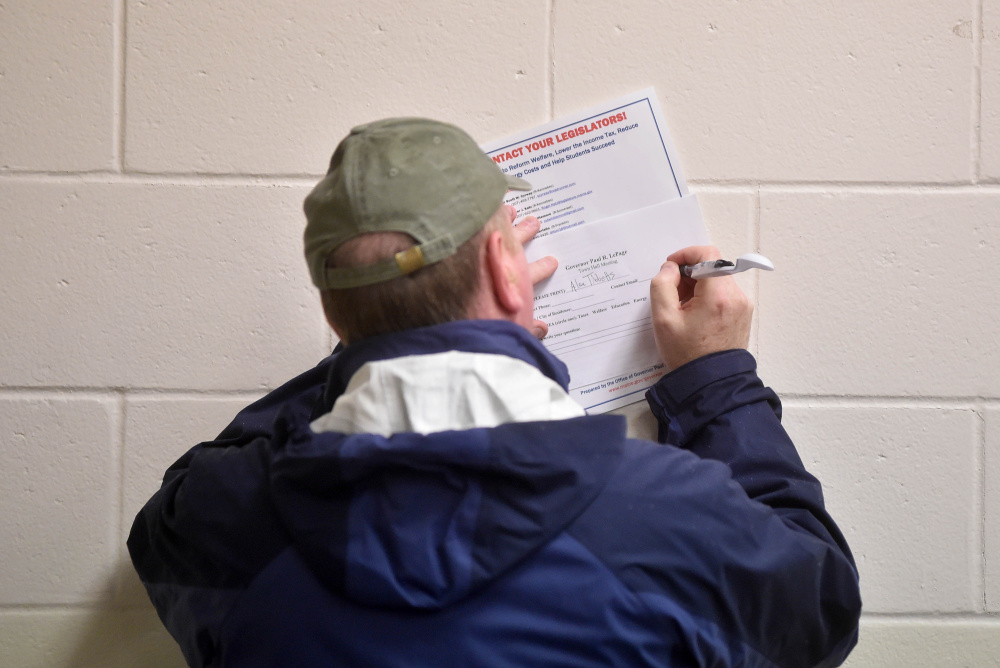WATERVILLE — Gov. Paul LePage pushed his plans for welfare reform and eliminating the state income tax Thursday when he brought his town hall tour to a mostly friendly audience in Waterville, where he was mayor before being elected governor in 2011.
Eliminating the state’s 7.1 percent income tax would put money into people’s pockets, and those people will invest in homes, vehicles and other things, LePage told the audience of about 70 at Waterville Junior High School.
“That’s how we get more money for people in the state of Maine,” he said. Increasing the minimum wage, on the other hand, would hurt elderly people and those on fixed incomes, he said.
He also addressed welfare reform, saying most people receiving welfare cards use them correctly, but that some spend their benefits in ways they shouldn’t. Electronic benefit transfer, or EBT, cards are loaded by the federal government on the ninth day of each month, he said. Between midnight and 3 a.m., 50 percent of the money on Maine recipients’ cards is gone.
“If you need baby formula between midnight and 3 a.m., there are not many places to get it in Maine – that’s all I’m saying,” he said.
LePage said he has no problem with refugees but does not support providing aid to asylum seekers, 70 percent of whom are returned to their home countries.
“So for two years, we take care of them and they’re sent back,” he said, adding that they are in the U.S. illegally and Maine shouldn’t be providing them with aid when the state struggles to help homeless veterans, those with post-traumatic stress disorder and those who cannot find jobs.
“I would think that we would take care of the people that we send over to keep us free,” he said. “We take care of them and we’re not doing a good job of it.”
Lorraine Rioux, who is retired and hearing-impaired, complained to the governor that she has had to fight with state officials to get MaineCare benefits to which she is entitled.
“MaineCare was going to stop my benefits,” Rioux said. “I had to drive from Waterville to (the U.S. Social Security Administration office in Farmington) to defend the fact that I did write an application and an annual review.”
The state Department of Health and Human Services, she said, is not doing a “fine” job.
“They’re not fine in the right way towards the elders and towards the poor,” she said.
LePage assured Rioux he supports funding for people over age 65 and those who are disabled. He said he wanted $46 million in the budget earmarked for helping the elderly and disabled, but much of it was put toward schools and other spending areas.
“I am with you 100 percent,” he said. “The people in Maine, when they turn 65, they’re kicked to the curb, just like our military.”
LePage’s press secretary, Adrienne Bennett, told Rioux information would be given to DHHS Commissioner Mary Mayhew, who was in the audience.
In response to a question about the state economy from audience member Gary Mayhew, LePage said that the single biggest thing the state can do to lower the unemployment rate is to provide work skills for people ages 19 to 49 so they can find jobs.
“Work readiness is the most important thing to lower the unemployment rate,” he said.
After the meeting, Rep. Thomas R.W. Longstaff, a D-Waterville, responded to LePage’s proposal to lower or eliminate the income tax.
“I think it’s worth having the discussion,” Longstaff said. “I don’t think it’s as easily or quickly resolved as he thinks.”
Send questions/comments to the editors.





Success. Please wait for the page to reload. If the page does not reload within 5 seconds, please refresh the page.
Enter your email and password to access comments.
Hi, to comment on stories you must . This profile is in addition to your subscription and website login.
Already have a commenting profile? .
Invalid username/password.
Please check your email to confirm and complete your registration.
Only subscribers are eligible to post comments. Please subscribe or login first for digital access. Here’s why.
Use the form below to reset your password. When you've submitted your account email, we will send an email with a reset code.